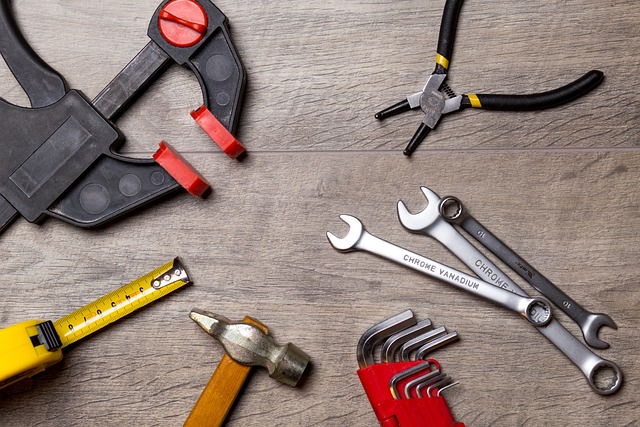Handyman confidence is honed through deliberate learning and hands-on practice. Beginners should start by acquiring basic knowledge, tools, and materials from reliable sources like online tutorials or local workshops offering handyman tips. It's crucial to grasp the functions of essential tools and safety equipment to ensure effective and safe tool use, which is fundamental in building competence and self-assurance. As novices tackle more complex tasks, their proficiency and confidence will naturally grow with each project completed. Organization, planning, and reflecting on achievements, combined with seeking advice from seasoned handymen, are key to enhancing one's handyman skills. The path to becoming a skilled handyman is gradual; each step enriches your ability and bolsters confidence. Essential tools for beginners include pliers, adjustable wrench, hammer, various screwdrivers, and a tape measure, with a multimeter for electrical safety checks being equally important. Protective gear like gloves, safety glasses, and a dust mask are non-negotiable to prevent injuries. As expertise develops, incorporating power tools such as drill/driver sets, impact drivers, circular saws, jigsaws, and reciprocating saws into your toolkit is advisable. High-quality tools are recommended for their reliability and performance. By systematically expanding your understanding of tools and applying handyman tips, one can create a robust foundation for proficient home repair and maintenance.
Embarking on the journey to becoming a confident handyman can be both exhilarating and daunting. Whether you’re aiming to tackle home repairs or aspire to turn your skills into a professional service, this article serves as a comprehensive guide for beginners. We’ll explore the foundational steps that set the groundwork for handymanship confidence, starting with understanding tools and equipping yourself with the necessary knowledge. From there, we’ll delve into mastering basic skills through simple projects, and then build upon your expertise with advanced techniques. Alongside practical advice and handyman tips, we’ll also cover how to network with experienced professionals and specialize in a niche that interests you. For those looking to elevate their confidence further, we’ll discuss professional development opportunities, including certifications and courses. Finally, we’ll navigate the steps to effectively market your services and build a strong handyman brand. Whether you’re a novice or an aspiring pro, this article is designed to empower you with the tools and insights needed to approach each project with confidence.
- Foundations of Confidence: Essential Steps for Beginner Handymen
- 1. Understanding Tools and Equipment: A Beginner's Guide
Foundations of Confidence: Essential Steps for Beginner Handymen

For those embarking on their journey as a handyman, confidence is not an innate trait but a skill honed through experience and preparation. Building a foundation of confidence starts with acquiring the right knowledge and tools for the trade. Beginners should start by familiarizing themselves with basic handyman tips and techniques, which can be found in abundance online or through community classes. Understanding the purpose and function of common tools and materials is crucial for gaining competence. Practice using these tools safely and effectively; this not only refines your abilities but also diminishes uncertainties that may undermine confidence.
As you become more adept at handling simple repairs and maintenance tasks, incrementally challenge yourself with projects of greater complexity. With each successful completion, your expertise grows, as does your self-assurance. Handyman tips often emphasize the importance of organization and planning; master these skills to ensure that jobs are completed efficiently and to a high standard. Engaging in hands-on practice, reflecting on past successes, and seeking feedback from seasoned handymen can further bolster your confidence. Remember, confidence is built through consistent action and learning. Each step you take toward mastering handyman skills contributes to a more confident and competent craftsman.
1. Understanding Tools and Equipment: A Beginner's Guide

As a novice in the realm of home repairs and DIY projects, it’s crucial to familiarize yourself with the various tools and equipment that are standard in a handyman’s arsenal. A well-equipped toolbox can empower you to tackle a wide array of tasks confidently. Start by identifying the core tools no handyman should be without: a reliable set of pliers, adjustable wrench, hammer, screwdrivers in various sizes, and a tape measure. Each serves a distinct purpose, from gripping, tightening, pounding, driving, and measuring. For electrical projects, invest in a reliable multimeter to check voltage and continuity safely. Safety gear is non-negotiable; a sturdy pair of gloves, safety glasses, and a dust mask are essential for protecting yourself from injury and harm. As you progress, expand your tool collection with power tools like a drill/driver set, an impact driver, circular saw, and possibly a jigsaw or reciprocating saw. Handyman tips often emphasize the importance of selecting high-quality tools; they not only last longer but also perform better, making your work easier and more precise. With each tool in hand and a clear understanding of its use, you’ll build confidence and skill with every project you undertake. Remember to approach each new tool methodically: read the manufacturer’s instructions, practice using it in a safe environment, and gradually incorporate it into your projects as you gain proficiency. By systematically building your knowledge and skillset around these tools and equipment, you’ll set a solid foundation for becoming a confident handyman.
Embarking on a journey to build confidence as a handyman can be a rewarding endeavor, and this article has outlined the foundational steps necessary for beginners. By familiarizing oneself with tools and equipment, novices can approach DIY projects with greater assurance. Handyman tips scattered throughout have provided practical advice to navigate tasks efficiently. As you continue to practice and apply these principles, your skillset—and confidence—will naturally expand. Remember, the path to confidence is incremental; each successful project is a step towards mastery. With dedication and the right approach, anyone can transform from an apprehensive beginner into a competent handyman.
